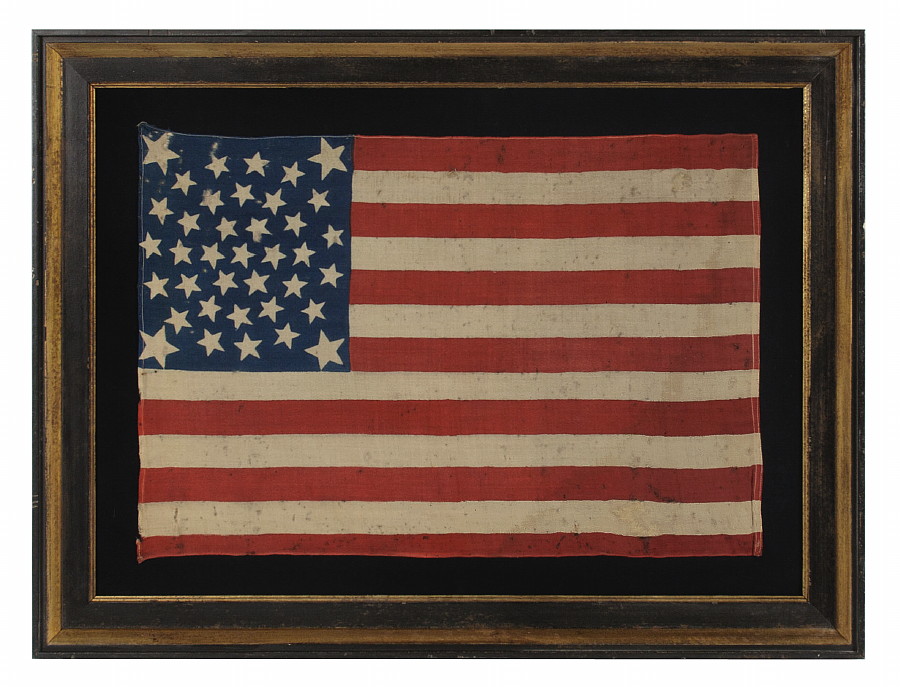
| |
38 STARS, COLORADO STATEHOOD, A RARE MEDALLION PATTERN FLAG WITH 4 LARGE CORNER STARS, MADE FOR THE 1876 CENTENNIAL OF OUR NATION'S INDEPENDENCE, PRESS-DYED ON WOOL BUNTING |
|
| Available: |
Sold |
| Frame Size (H x L): |
Approx. 34" x 45" |
| Flag Size (H x L): |
23" x 33.75" |
|
| Description....: |
|
38 STARS, COLORADO STATEHOOD, A RARE MEDALLION PATTERN FLAG WITH 4 LARGE CORNER STARS, MADE FOR THE 1876 CENTENNIAL OF OUR NATION'S INDEPENDENCE, PRESS-DYED ON WOOL BUNTING:
38 star American national parade flag, press-dyed on wool bunting, with a very unusual type of medallion star configuration. This has 4 large stars in the corners, flanking a triple wreath pattern of smaller stars, with one small star in the very center. Medallion designs, like this one, typically have a large center star. The absence of a large center star makes for a visually unusual flag. Also adding to the presentation is the somewhat crowded arrangement of the wreaths and tall and narrow proportions of the royal blue canton. The combination of all these things results in a particularly bold and visually arresting design.
Many fantastic star patterns were made in the patriotism that accompanied or nation's 100-year anniversary of independence in 1876 and this is one of the more interesting examples. because there were no regulations concerning either star configuration or position until 1912, many flag-makers went out of their way to catch the attention of potential buyers.
It is very likely that this flag was made for Horstmann Brothers (also call Horstmann & Sons at one time) in Philadelphia, a major military outfitter. Horstmann did not make their own flags, but put their name on many of the things they sold. Similarly unusual 38 star flags with press-dyed construction have been discovered with sewn, cotton sleeves, on which the Horstmann name was printed. Due to the fact that the Centennial International Exposition, a major World's Fair event, took place in the same Philadelphia, it is logical to assume that Horstmann supplied these flags for the centennial celebration.
Press-dyed wool flags are far more scarce than those printed on cotton and silk. Most parade flags were made of cotton because cotton was inexpensive and such flags were often intended for one day's use only at a specific parade, political rally, a reunion of soldiers, or some other patriotic event. The Centennial Expo went lasted for six months, requiring decorative flags that would last for a longer period. It is reasonable to assume that press-dyed wool flags were made for just such a purpose, because wool sheds water is more appropriate than cotton for extended outdoor use.
The 38th state, Colorado, gained statehood on August 1st, 1876. This was just 28 days after the official centennial celebration, which took place on July 4th. Although 37 was the official star count in 1876, flag-making was a competitive venture, and no one wanted to be making 37 star flags when others were making 38's. It is for this reason that counts of 38 and 13 (to reference the original 13 colonies) stars are more often seen on flags made in the year of the centennial. Some makers were actually producing 39 star flags, in hopeful anticipation of the addition of another Western Territory. The 38 star flag was generally used until 1889, when four new states joined the Union.
Mounting: The flag has been hand-stitched to a background of 100% cotton twill, black in color. The black fabric was washed to remove excess dye. An acid-free agent was added to the wash to further set the dye and the fabric was heat-treated for the same purpose. Fabric was stitched to the reverse of the flag before the mounting process, both for support and to strengthen its color against the black background. The mount was then placed in a black painted, hand gilded and distressed, contemporary Italian moling. The glazing is U.V. protective acrylic.
Condition: There is minor soiling. There is minor mothing throughout and there are two small areas with slightly more significant loss. The flag presents beautifully and shows its age gracefully. Many of my clients prefer early flags to show their age and history of use. |
|
|
|
| Collector Level: |
Advanced Collectors and the Person with Everything |
|
| Flag Type: |
Parade flag |
|
| Star Count: |
38 |
|
| Earliest Date of Origin: |
1876 |
|
| Latest Date of Origin: |
1889 |
|
| State/Affiliation: |
Colorado |
|
| War Association: |
1866-1890 Indian Wars |
|
| Price: |
SOLD |
|
| |
Views: 3587 |
|
|
|

